#but there are a lot of various argument in terms of if our understanding of the world can be reduced to formulas
Explore tagged Tumblr posts
Text
OH YOU THINK THE EARTH IS PERFECTLY ROUND DO YOU? HOW QUAINT. WELL IT ISN'T. THAT'S SIMPLY AN APPROXIMATION. EVEN SAYING IT'S AN OBLATE SPHEROID IS AN APPROXIMATION. OUR FORMULAS FOR THE EARTH CAN ONLY APPROXIMATE THE TRUTH. TO ASSUME THE EARTH ISN'T A SPHERE AND THEREFORE MUST BE A TURTLE IS A FUCKED UP LEAP OF LOGIC.
NOW WITHOUT GETTING INTO THE STUPID ASS EPISTEMOLOGY AROUND APPROXIMATING TRUTH. DUALISM IS NOT ABOUT THE SUPERNATURAL!!! IF YOU STOPPED STARING AT THE SHADOWS ON THE WALL ON AND TURNED AROUND TO SEE THE TRUTH YOU WOULD REALIZE HUMAN EXPERIENCE IS MORE THAN THE MATERIAL WORLD (Republic BK. 7).
YES THE WORLD IS OF MATERIAL FORM, SAYING SO IS NOTHING MORE THAN A BORING TAUTOLOGY. THE EXPERIENCE OF THE HUMAN MIND IS GREATER THAN SIMPLY THAT OF THE PHYSICAL WORLD. THE MIND AND BODY ARE BOTH DIRECTLY LINKED TO THE PHYSICAL WORLD, YET DISTINCTLY DIFFERENT; THE MIND CANNOT BE REDUCED DOWN TO THE PHYSICAL WORLD AND REMAINS ONTOLOGICALLY DISTINCTIVE (Chalmers's Conceivability Argument for Dualism, 2001).
YOUR ARGUMENT RUNS UPON THE FALLACY THAT WE EXPERIENCE THE PHYSICAL WORLD, THEREFORE OUR EXPERIENCE IS THE SAME AS THE THE PHYSICAL WORLD. QUALIA IS AN EMIGRANT PROPERTY OF CONSCIOUSNESS AND EXPERIENCE OF THE PHYSICAL WORLD AND THEREFORE IS DIRECTLY LINKED TO IT, NOT SOME SUPERNATURAL AND SEPARATE IDEA.
Bibliography: Republic BK. 7, 514a - 518b, (Ch. 9 'The Supremacy of the Good', pp. 240-245) Retrieved from: https://search.ebscohost.com/login.aspx?direct=true&AuthType=shib&db=nlebk&AN=688165&site=ehost-live&custid=s1165276&ebv=EB&ppid=pp_240 Brueckner, A. (2001). Chalmers’s Conceivability Argument for Dualism. Analysis, 61(3), 187–193. Retrieved from: http://www.jstor.org/stable/3329232
The concept of a “favorite color” is so funny
#no actual hate here#if you are curious a comment argument against dualism in specific regards to mary's room is that is the world is all of material form#then mary can't have known everything there is#and experience and the physical world are one in the same#Chalmers does have a length argument on philosophical zombies against materialism that I didn't have time to get into here#have read some arguments against it as well which are also interesting#I didn't really want to get into the approximation of knowledge as epistemology is sort of an adjacent topic to this#but there are a lot of various argument in terms of if our understanding of the world can be reduced to formulas#(see David Hume and Karl Popper for different views on approximation of knowledge and empiricism)#also various argument on the nature of the world and if it's open or closed#lot of stuff on evolution and false beliefs in epistemology#anyways sorry big rant in notes#philosophy major really finding it's use here on tumblr#Philosopy#Autumn's Thoughts
95K notes
·
View notes
Note
I'd love to hear your structural hot takes
I already rambled a lot about this here, but alright okay yes I got more. I am here to talk about bullshit and nonsense after all 😤
If we're still talking about how DSMP is a prime example of New Media, and various frameworks you might use to understand it as an example of New Media, then I think it could be useful to bring up the concept of the violence hub.
Before I get into all that I need to define another term: rhizomatic storytelling, which means a narrative that is decentralized, nonlinear, and intricately networked. Does DSMP fit into this category? I would say so, even though it doesn't necessarily fulfill all criteria. It's definitely decentralized (I've already talking a bit about how it's difficult to pin down the parameters of the "core text" when it comes to MCYTRP) and it's definitely a network of little stories coming together to form a cohesive(ish) narrative. But one thing DSMP isn't is nonlinear. It's a very linear story, in the same way that professional wrestling (which is famously fictionalized) is very linear. It's been pointed out by fans that the storylines in pro wrestling pass at the same rate as time passes in the real world - which is pretty unique! You can't say that about most stories, even most forms of serial fiction! But, interestingly, DSMP is the same: time in the story passes at more or less the same rate as time passes IRL, with the exception of periods spent in limbo. This raises some interesting questions about who determines linearity in a prosumptive (co-created by writers and audiences) piece of media. If you're looking at DSMP from the perspective of the CCs, it's a linear narrative in the ways I've just described. But if you look at it from the perspective of the audience (who are given the option to switch between streams, watch live, watch VODs afterwards, watch VODs out-of-order, or refuse to watch some streams/VODs altogether), then it can be - and often is - a very non linear story. In a straightforward narrative where the creators create and the consumers consume, this isn't even a question. But in the case of something like DSMP, which is a collaboration by creators and audiences, those lines of authority blur and we're left wondering whose timeline we're on.
So let's say, for the sake of this argument, that DSMP is a rhizomatic story. It doesn't check off all the boxes, but I would still say it qualifies for reasons I hope I've outlined above in at least a semi-comprehensible way. Well, there's this framework that's been developed for understanding these types of non-linear, decentralized stories: the violence hub.
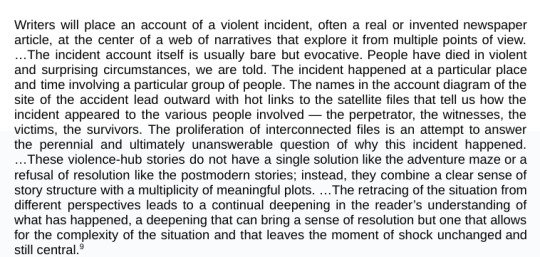
The violence hub was proposed as a way of furthering our understanding of these participatory “multithreaded” stories that offer many voices at once without giving any particular one of those voices the final word.
Personally, I think DSMP is sort of the perfect example of a violence hub story, obviously because of the way it's constructed (talked about this a lot already here so I won't rehash it rn) but also because, quite frankly, it is a violent story. DSMP is bleak as fuck. Warfare, conflict, and abuse are core motifs. Like, even in a fandom as divided as this one, it's not controversial to say that DSMP is a story that's fixated on suffering, and that fixation is one of its main selling points. Not all fans are interested in those parts of the story, of course, but I think it's safe to say a lot of fans find DSMP's treatment of suffering pretty compelling. This is why people are insane about Exile and Pandora and Pogtopia and, and, and. You get the picture.
The violence hub is also a useful way of looking at not just how the story is structured, but how it is consumed. When fans talk about a violent incident in the story, whether it's Exile or c!Dream's imprisonment or something else, oftentimes we talk about these events in relation to other characters' perspectives and POVs. What's c!Tubbo up to during c!Tommy's exile? Who does or doesn't try to visit Logstedshire, and at what points in the Exile timeline? What's c!Dream doing during the Exile period when he's not at Logstedshire? This interactivity with the incident (Exile) through various other POVs deepens viewers' understandings of that incident, what it means to the characters involved, what it means in the larger narrative, and most importantly - what it means to us, the viewers. The same thing could be said about any period that qualifies as a "violent incident" described in the article screenshotted above. Take Pandora, for instance: how many times have you heard someone say "You really need to watch c!Sapnap's prison visit to get a sense of what it was like," or "c!Techno's prison podcast is vital to understanding what happens in Pandora," or something else to that effect. We all have specific streams we see as crucial puzzle pieces, but we don't all agree on what those streams are. And, depending on which streams you see as vital, your idea of what went down during a particular violence hub incident may be very different from my perception of that event, and vice-versa. Be that as it may, consuming the story this way, rather than in the form of a traditional linear narrative, allows viewers to come to more nuanced understandings of not just the incident in question, but also why the incident happened, what other events led up to it, the later impacts it had on the story, how character relationships and dynamics may have shifted as a result of the incident, etc. The decentralized nature of this structure enables an understanding of the story that appropriately accounts for its complexity.
Now that all that's out of the way, I want to talk about the structure of the violence hub in relation to audience expectations. When the finale aired, I was pretty confused by a lot of folks' reactions, partly because of how I perceived the DSMP and how I see its structure interacting with its themes. To me, DSMP is a story largely about cyclical violence, so an ending where c!Tommy (a main character, driving force for the narrative, and sometimes the protagonist depending on who you ask) chooses to put an end to that cycle made sense to me. I never saw the finale as being about an abuse victim forgiving his abuser, I saw it as being about an abuse victim purposefully stepping back, seeing the cycle of violence for what it is, and choosing to opt out. This is a fairly unpopular interpretation of the finale, but it's one that I stand by because it's firmly grounded in the text: the dialogue, the scenecraft, the structure. Up until the finale, c!Tommy perceives the DSMP as a linear, centralized story - his own! He acts accordingly, rarely stopping to consider consequences or other characters' perspectives. When he's sent to limbo in the finale, c!Tommy is suddenly able to see into c!Dream's past memories from c!Dream's perspective. In this moment, c!Tommy's experience of the narrative ceases to be linear and centralized; in this moment, he is experiencing the story in the same way that we, the audience have been experiencing the story. c!Tommy, placed in the audience's shoes, is presented with what is essentially a "branch" to the violence hub that is Exile, that is Pandora, that is the aftermath of both of those arcs. Upon seeing that "branch" (the memory), c!Tommy is given context for some of the events that have happened on the server. This newfound context allows him to understand his own story as a part of the stories of the people around him. This newfound context enables him to understand the story in a way that accounts for its complexities. He doesn't forgive c!Dream, but he is able to recognize the cycle of violence and choose not to participate anymore.
So, back to the thing I said about structure and audience expectations. As I mentioned, a lot of fans hated the finale for a lot of reasons. It wasn't to everyone's taste, and that's fine. But I would like to posit that one reason people didn't like the finale was because the rhizomatic structure of the story (which c!Tommy becomes aware of) subverted their own expectations about storytelling in general and this story in particular. I'd argue that a lot of people hated the finale because they were still clinging to the possibility of a non-rhizomatic narrative: one that has a traditional beginning/middle/end, one that has clear heroes and villains, one in which unambiguous good vanquishes unambiguous evil. Which isn't a bad thing to want, it's just...not what DSMP is, or ever was.
21 notes
·
View notes
Text
So I'm reading "Biological Exuberance: Animal Homosexuality and Natural Diversity" by Bruce Bagemihl.
And it's from 1999 so half of it is "yes for real homosexuality is found in nature, plz no discriminate :(" But then I got to the chapter on "Nonreproductive and Alternative Sexualities in Animals" and
Vitually every animal population includes nonbreeding individuals. There is a tendency to regard the urge to procreate among animals as instinctual, all-pervasive, and unstoppable. While heterosexual interactions often do have that quality, there are just as many examples of animals who do not reproduce: individuals who actively remove themselves from the breeding cycle...
and
Why do animals not reproduce? Biologists have coined the term reproductive suppression to refer to various forms of nonbreeding, implying that all animals would breed if they could but are somehow "prevented" from doing so. However, the underlying mechanisms involved in nonbreeding are far more complex than this name implies...animals are often "voluntary" nonbreeders...
And listen. Listen. There's another quote that I thought was referenced somwhere in this book (cannot for the life of me find which page it is on though) that's like "when animals do something we like, it's natural, and when they do something we don't like, it's animalistic." We don't need to "prove" that asexuality is biological in nature in order for asexual people to deserve rights and respects. We've gone through this dance with homosexuality and transgenderism.
But a human being is an animal, and studying other animals shapes our understanding of what it means to be one kind of animal among many. And the idea that an individual's purpose is to reproduce is pretty capitalistic, if you think about it.
The other half of this book is a list of which animals have documented homosexual behaviors, and a description of those behaviors, and even though a lot of it is "X percent of males were observed doing Y behavior, X percent of interactions were Y in nature," it really drives home that animals are complex individuals. No one wolf is going to behave exactly like another wolf, any more than any human will act exactly like another human. Maybe there is an evolutionary advantage, maybe evolution is just weird and messy, but that's how the world is. The whole argument that "if everyone were gay/asexual/engaging in nonreproductive sexualities then the species would go extinct" is technically true but that's an extremely individualistic viewpoint. As a species - as a community - there is room for so much more.
Basic biology teaches us that all animals are driven by the need to reproduce, but advanced biology once again reveals a more complex picture.
This is just a long way to say that I didn't think I needed ace affirmation in scientific literature but actually I kind of did.
24 notes
·
View notes
Text
Rann, a land of Fighting and Steel (p1)

Well, its a bit out of date and amateurish - nothing like my favorite map, that's for sure - but this is the one I could get scanned in with the damn computer I'm typing from. Did you know that computers scream in frustration sometimes? I didn't. Nether the less, I suppose we should discuss the various places of Rann, else how would you know where you're going, eh? The King Eternal's tenants teach that Castle Town is the center of Rann, but he's not writing this, I am. Thusly we'll start at my sister's little hovel:
Royalscorn (Hamlet - Population 242 Humans, 482 Pokemon circa '21): Tiny place, really. Was once a small farming village that refused to pay taxes, thus guards were sent. The guards married into the village. The village refused to pay taxes. This goes on for 19 generations until a renaming and pardoning of the stubborn lot. Big exports are Moo Moo Milk and Mareep wool. Home of the PokeProfessor Holly.
Dawnbreak Forest: Of course next to those stubborn lot in Royalscorn would be the one place the repelled the Eternal King's unification for 3 months. The number of insects and terrible dark type Pokemon wandering these woods is only matched by the presence of the Rangers. The Rangers are assembled by Duke Brilloth, their purpose is to appease the Titan of the Woods and to prepare to kill the king (hah!).
Rustroil City (City - Population 2600 Humans, 900 Pokemon circa '21): Technically one of the few places that qualify as a city. Rustroil being the official port of Rann means its allowed leeway in terms of technology, but they take it too far. (A tower made of television screens, really?). Still, a very important port town under the vasselage of the Kohn Family and the young Duke Kohn, age 13. They are our link to the world outside such as Paledea and Unova.
Ridge Spine Mountains: I have long suspected that something monsterous made the Ridge Spine Mountains, but they are too vast and their hostile Titan too agitating to my senses for investigation. Still, a passage from Dawnbreak to Little Southrock does exist, although as I understand it the Onyxs in the region often rebuild entire walkways, so mayhaps its gone. No Duke resides over it, technically its Duke Brilloth's realm, but its fossil deposits are invaluable.
Oshwat Town (Town - Population 920 Humans, 350 Pokemon circa '12) An invasion outpost. That's what it is, and I won't be brokering no argument. How else do we allow a clan of spies from the Kanto - all female I might add - take up and tend to land in Rann? I don't know what honeysuckled words these ladies offered but every year more and more potential witches go to live in their clay-tiled houses. (Also, they attempted to shoot down my precious Persephone who was just doing some scouting).
University of Leech (College - Population 1331 Humans, 1200 Pokemon est. circa '23) Our first hallowed halls of learning - well I suppose unhallowed due to the ghosts - focused on life and death, sorcery and potion creation. As of the decree of '63, any young warlock or witchling found amongst the populace has 2 years to report for training and study in these halls. I was trained in these halls. A horrifically haunted place with plenty of ghost types, the have woven a cloud to remain stationary above the main campus at all times, keeping the sun at bay and occasionally raining. Duchess Lilltom presides over it and the surrounding township.
Milldale aka Witch's Burg (Hamlet - Population 422 Humans, 920 Pokemon circa '23) Officially the town is called Milldale due to the exporting of, well, mill and seed. However, those from the college and the residents themselves call it Witch's Burg as to man they are magically inclined. Lovely sort. Everyday is a farmer's market and every night a festival of someone's gods (Although never to Arceus himself, oddly enough). Well, this old woman has typed long enough. I think I'll go for a midnight haunt of the swamp. Perhaps there's some trainers ambling about? I hope this has been informative, to say the least. - Professor Balsam
2 notes
·
View notes
Text
(Epistemic status: armchair)
What does one need to learn, in concrete-ish terms, to do math?
One can understand various structures and how they generally behave. This is useful! But answers the wrong question; that's what math currently is, not how to advance further. Statics of mathematical knowledge, stated bare, won't tell you how they were built, nor how to build something else you might want. (You might infer these yourself, but ideally you wouldn't need to.)
A necessary but insufficient skill is to understand proofs. Formal arguments are the diamond we build our castles from, and if you don't see the faults nor can check for faultlessness, you can't produce one and know it to work.
(I think math education is ~aware that this is a skill it needs to teach? I'm not sure it figured how to teach it deliberately, but might be uninformed.)
Another is filling in ~a broad gesture that claims to be a proof. (Including, on one hand, digging up, checking, and compiling all the references the claimant used without explanation; on the other, fixing all the punctuation and streamlining notation abuse; and finally, generating all by yourself the gaps of "uncomplicated derivations left to the reader to verify".)
(This, I stole from Tao, so at least many know this is a thing, & hopefully agree it's important. Is it taught? Not..explicitly, not by textbooks or lectures I've seen; except by fill-this-in exercises and examples of faulty notation and necessity to understand what's written. Which is a lot, come to think of it. Maybe this is taught; just, without naming or drawing attention to it? Orrrr in nonpublic settings like talks, discussions, or seminars. Hm.)
Third, knowing the tools of the trade, which are: proof tactics generally applicable in your domain of interest. Acquire an ε of breathing room. Count something in a couple different ways. Look for a contradictory descent. Bound an integral with no closed form with similar ones with closed forms. Taylor-expand and ignore small-enough terms. Use a dumb bound. Cut things into pieces and then use a dumb bound.
(I feel like these do not get enough attention — shouldn't there be dedicated chapters "how to prove 90% of analysis with 5 clever tricks" — but I can't say with a straight face that they aren't taught. Although again, would it kill people to say "first, we'll simplify by getting an ε of room"? You know you're doing this; I can kinda figure out you're doing this because I read Tao 5 years ago & also spent hours figuring the proof myself beforehand; what do you expect a random reader to get beside "magic happens, qed"?)
(3.5: there are some ~fully general proof tactics like "use induction" which are...probably taught satisfactorily. Could be taught better, maybe — wrangling the exact form of the theorem so it inducts well is not generally trivial! — but, ok, maybe in a specialized course for induction-heavy fields.)
For 4, I'll put not so much proof tactics as ~ways to take small steps from initial ignorance towards a complete argument. Produce some examples; produce some counterexamples (that violate premises ofc). Try to explain why the conclusion holds in the examples; does this generalize? Suppose the conclusion holds given some property generalized thus; can you invent an example without it? (Maybe the property follows from the premise; maybe it doesn't, but now you can assume it to be false for free; either way, simplification!) Having proven a special case, can you weaken its assumptions but not the conclusion? (What-are the steps of the special-case argument, what do they rely on? Can their supports be replaced with something else?)
(This feels silly / too-simple-to-work, but...for one, things that work are not stupid, and having a list of obvious ideas to try works everywhere else, so. For two, this often helps even if you have absolutely no idea how to approach the theorem. For three, apocryphally, that's how the entire research process works: you solve a tiny special case A, someone else solves a similar B, someone else generalizes a little to C, someone else adapts the tooling to XYZ.....)
---
(There are other things — writing actual papers, looking for useful cutting-edge research, collaboration, smth smth getting to a stable orbit — which I'm unqualified to comment on; I'll pretend these are not Doing Math per se, though really they deserve no less recognition and teaching than pure proof rotation.)
(Although Let It Be Said that writing good, accessible, readable papers is a decidedly undertaught competence.)
---
There are another 2 ?capabilities? of a ~working mathematician that come to mind. (Not being one, can't introspect on them or split them into practicable subskills, sadly.)
5 is kind of tools-of-the-trade writ large; an eagle's-eye view of a whole ~subject and tricks it uses way up the abstraction ladder from foundations; pieces and glue out of which to build high-level proof sketches the way simple full proofs can be built from standard proof-techniques.
As for the 6: where do definitions come from? Whence finite intersections and arbitrary unions of open sets? How does one define a measure without yet knowing what is a measure? Why topoi?
To ask a good question is to be halfway to an answer; a good structure will do most of the work for you, rendering confusing things obvious and demanding little in assumptions. Good structures come from somewhere, and no-one will tell you where*.
(Yes, yes, You Could Have Invented Spectral Sequences. Very fucking funny.)
(Maybe it's the same old thing, try to generalize, and when you've seen enough, you notice a generality no-one articulated before. Or perhaps you push and push your setting to be as general as it should be and you end up with schemes. Or possibly you grope blindly in the darkness of the unproven, build yourself a useful concept to orient with, and it sticks. Who knows! Ask me again if I invent something.)
#my math education issues let me show you them#math#posts#* blatant lie#at the very least there are histories about development of modern structures which are likely informative
13 notes
·
View notes
Text
Four types of reading (and notes-taking) strategies

The actual doing of a PhD (and research) can be simply described as reading and writing. However, this doesn't tell much about what to read, how to read, and implications for notes-taking and writing, where there are much variations exist than looking from the surface. Should I read book or paper? Full length / cover to cover or just flipping through? Should I write summary of ideas, critiques, or articles? How to organize these notes? These questions are particularly perplexing at the beginning of one's research journey / PhD journey and are easily overwhelming.
Looking back from one year into my PhD (in design, but generally applicable to transdisciplinary studies in wider social sciences / humanities), I see four types of reading that serves different purposes at various stages.
read to scan the landscape
This is the reading that takes a majority of my time in the first year of PhD. The nature of transdisciplinary study determines that a lot of grounds need to be covered before one develops an idea how her research is positioned in historical/disciplinary contexts. In this stage I read widely (and often in rotation) on topics including (looking down from my desk and on the stacks of papers on the ground):
sustainability, degrowth and postgrowth, ecological economics
theories on embodiment, practice theory, cognitive science and ecopsychology
entrepreneurship studies, entrepreneuring, sustainable entrepreneurship
action research and transdisciplinarity
postqualitative methods, more-than-human methods, non-representational theories
Ecofeminism, political ecology, environmental ethics
complexity theories
Once I was asked the question "are PhDs really that busy?", I tried to describe my confused, lost and almost drowning feeling at the start of my first year. Now I see it is a necessary stage to go through (and maybe experience again when entering new fields) as certain "conceptual system" and vocabulary needs to be established.
The purpose of this stage is not to learn by heart and each theory and author that you encounter, but to "get a rough sense" what are the important themes that interests you in concerned fields. Therefore I don't recommend reading books too early in this process and spend too much time do detailed reading and notes-taking. Sometimes even just doing abstract reading is enough. Also as in this early stage you don't necessarily have the research question, or it is still very roughly phrased, some common advices like "read with a question", or to follow Niklas Luhmann to not to quote what you are reading but make connection to your question simply don't apply.
This stage is like how life and pattern is emerging from chaos... what matters are the general feeling of the field in general, recognition of a few key authors, and identifying a few groundbreaking articles/books and good review articles.
In terms of notes-taking, I heavily rely on physical copies of paper (despite not best for the environment). Printed copies leave physical artifacts which 1) remind us their existence 2) can be re-organized and re-grouped later according to our latest conceptual model.
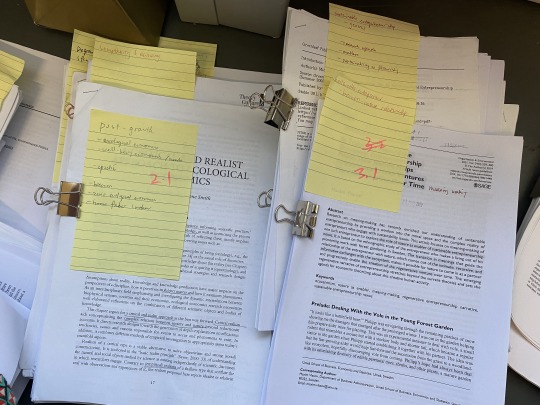
I find writing a few points that touches me (not necessarily the authors' most important arguments) on the top of the cover page of the paper works for me. If time allows I may put them into Roam Research (my notes-taking app), but it is not compulsory. But leaving multiple traces of materials encountered, including print it out, add entry in endnote, and write down authors and book/paper titles in one central place (e.g., Roam Research, not a random notebook!) are highly recommended. This would help tramendously particularly in stage 3.
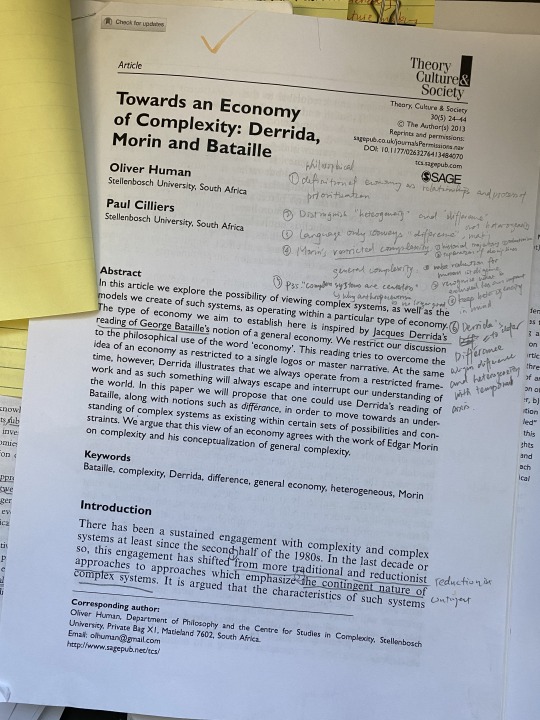
2. read to understand the fundamentals
By the end of the first stage, you should be 1) developing a sense what a field is about and how it is related or different from relevent fields 2) what are the most important theories and authors that everyone start their research with. The second type of reading is therefore to single out these authors and their most important work. For papers I suggest to read them in full length. For books deep reading at least introduction chapter and selective chapters of interest. Take good notes including important definitions, concepts and quotes. Mark clearly citation and page numbers. These reading notes will be used again and again in the future for writing conference papers / journal articles / thesis.
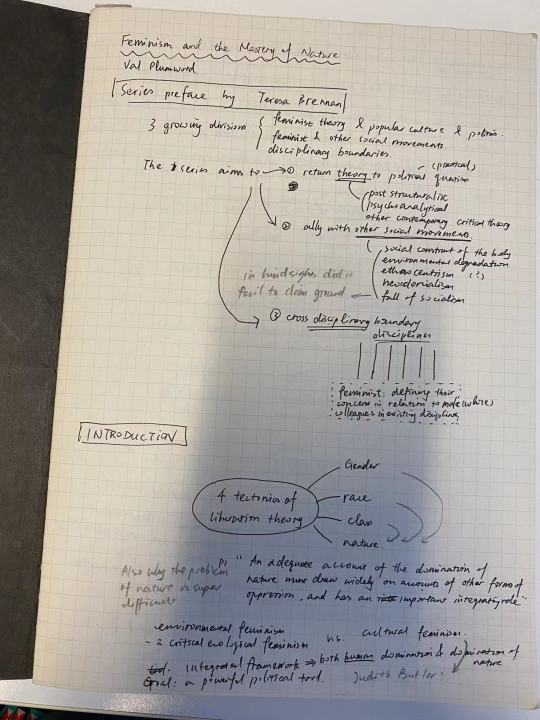
I have to admit this kind of reading is a luxury particularly given my "academic ADHD" that I described in the last post. However, I see this deep reading and engagement with important writers fundamental in forming my own thinking. Also, when presented a new theory, the first impression may be the sharpest in terms of potential conflicts with existing knowledge. This provides perfect entry for critical evaluation and development of your own thoughts. Therefore I do recommend active reading (as suggested in "how to read a book") and to write your first reactions either on the margin of the book, in a notebook or in your notes-taking system.
When it comes to this deep engagement with books/papers, notes-taking is always a struggle. On one hand, reading offline (facing book and notebook, not a screen) helps me to concentrate and think. On the other hand, offline written notes present real challenge to locate in future research. I don't have a definite answer on this yet.. Sometimes I take notes in Roam directly, other times I write notes with pen and paper (but seldomly type them into Roam). I'm also trying to take picture of my notes and upload to Roam, so that I may be able to read some of my notes when the time comes.
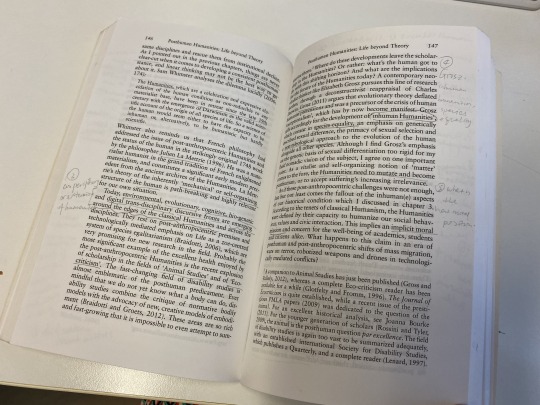
3. read to compare and write
This is the time I'm going through right now, developing my confirmation report and some other revision / paper projects. What precedents this stage is a rough structure of the thing you are writing - an outline and a few sentences to describe what you want to write for each section. These ideas are generated from the stew of type 1 and type 2 reading, and there is no linear process to reach them. But once you've got there, then you have better idea of what is the thing you are developing based on which topics or even authors you have read.
The writing / notes-taking in this stage happens directly in the work (paper or report) I developing and serves directly the objective of dedicated section. I will collect notes I've taken in the previous stages, locate the text in books/papers that is most relevant to my goal here, and write paragraphs in the paper. Note the writing here is not general introduction of theories, but really pinned down to specific views and their connections / differences.
4. read to go beyond / get new perspectives
The way academic research, particularly PhD research, is usually framed is a constant zooming in and narrowing down. But this can be dangerous sometimes. It is not uncommon in my reading hopping across different disciplines to find scholars in different fields are concerned with very similar problems with different vocabularies. Notably there are usually certain biases within a field that are not visible from within the field but only from a completely different field.
An example is that sustainable entrepreneurship is often stuck with either three intersecting circles of social, economic and environmental and a concentric model with economic in the middle circled by the social and then the environmental. But essentially both of them has an inherent dualism, viewing human and nature goals as competing, or seeing material and energy dependence the only connection between human and nature. Reading anthropology (e.g., Descola or Ingold) provides a completely different view on this.
Again this is probably against what "proper academic research" is supposed to be, but it is my belief that a lot of value could be created by these distant comparing and making sense of. So when I have some flexibility in time, I would attend speeches and seminars that seem don't have much to do with my topic, listen to non-relevant podcast and follow some of the interesting references they provide. This kind of reading is loose and free flow, without goals in mind. But I believe in the long-term they will become seeds feeding into another cycle starting from type 1 reading.
I do acknowledge that every research is different, so should be the strategies for reading. My way of learning is quite broad which may not make sense for everyone. I do think there is a big mystery in terms of how we are reading and writing and there are different patterns in different stages. You are welcome to share yours!
Photo credit
9 notes
·
View notes
Text
Assignment Help for UK Universities: Reliable Support for Every Student
Academic life in UK universities can be exciting, but it often comes with many responsibilities. From attending lectures and seminars to completing assignments on time, students have a lot to manage. Whether you’re studying at the University of Oxford, the University of Manchester, or any other leading institution, assignments are a major part of your academic journey. That’s where Assignment Help for UK Universities becomes valuable.
At TutorHelp4You, we provide practical academic support for students across the UK. Our services are designed to help you understand your subjects better, improve your assignment quality, and meet your deadlines without stress. If you're feeling overwhelmed with multiple tasks, we’re here to assist you at every step.
Why Students Look for Assignment Help
Every student wants to do well in their courses, but sometimes there are just too many things happening at once. Here are a few reasons why students across UK universities often reach out for assignment help:
Time Constraints: With part-time jobs, group projects, and exams, finding enough time to focus on assignments can be difficult.
Complex Topics: Some subjects involve detailed research and complex theories. Getting expert support can make things clearer.
Improving Academic Performance: Well-written assignments can help you score better grades, especially if you’re unsure about the format or content.
Language Barriers: For international students, writing assignments in fluent English can be a big challenge.
No matter your reason, TutorHelp4You is here to help students across various UK universities handle their assignments more confidently.

What We Offer at TutorHelp4You
At TutorHelp4You, we focus on offering complete assignment writing services that meet academic standards in the UK. Whether you're pursuing undergraduate, postgraduate, or research-level studies, we provide assistance across different formats and subjects.
1. Essay Writing
Whether it's an argumentative, reflective, or analytical essay, our experts can assist in structuring and writing it based on your topic. We follow the required referencing styles such as APA, MLA, Harvard, or Chicago.
2. Dissertation Help
Dissertations are long, detailed, and require in-depth research. Our writers can support you with topic selection, literature review, research methods, and final draft preparation.
3. Coursework and Homework
Regular coursework and homework are part of every academic term. We assist with writing tasks, practical solutions, and project work to help you stay up to date.
4. Report and Case Study Writing
Many courses ask students to write formal reports or analyze case studies. Our writers understand how to structure these reports in a clear and professional way.
5. Editing and Proofreading
Already written your assignment but want to polish it? Our editing team checks for grammar, clarity, formatting, and consistency.
Who Can Benefit from Our Services?
Assignment Help for UK Universities is useful for students in various fields, such as:
Business and Management
Engineering and Technology
Nursing and Health Sciences
Law and Criminology
Computer Science and IT
Arts and Humanities
Whether you’re a local student or an international one, whether it’s your first semester or final year—we can guide you through your assignments step-by-step.
Features That Make TutorHelp4You a Reliable Choice
Here’s why many UK students trust TutorHelp4You:
1. Expert Writers
Our team includes qualified professionals with academic and industry knowledge. They understand what UK universities expect in terms of structure, referencing, and content quality.
2. Plagiarism-Free Work
All assignments are written from scratch and passed through plagiarism checks. We value originality and academic honesty.
3. Timely Submissions
We respect your deadlines and always deliver assignments on or before the agreed time. You won’t have to worry about late submissions.
4. Affordable Services
We understand student budgets. Our prices are fair, and we often run discounts to make our services more accessible.
5. 24/7 Support
Our customer service team is available around the clock. Whether you want to place a new order or ask about a current one, we’re here to assist you.
How to Get Started
Using Assignment Help for UK Universities through TutorHelp4You is simple. Here's how you can begin:
Share Your Requirements: Submit the details of your assignment—topic, word count, deadline, and university guidelines.
Get a Quote: We’ll offer you a fair price based on the work required.
Make the Payment: Choose a payment option that’s easy for you.
Relax: Our writers will get started and deliver your work before the deadline.
Review and Ask for Changes: If needed, we also offer revisions to match your expectations.
You can reach out to us via WhatsApp, call, or social media for quick support and updates.
Our Mission
Our goal is to support students across the UK with genuine academic assistance. We believe that every student should have access to reliable guidance, especially when assignments and deadlines start piling up. Our platform, TutorHelp4You, is built with the aim to make learning and academic writing easier for university students.
Contact Us
If you're ready to get started with Assignment Help for UK Universities, we’re just a message or call away.
📞 Contact Number: +91 9466729081 🌐 Website: TutorHelp4You
Conclusion
Academic life in the UK comes with many tasks and expectations. With multiple assignments, research projects, and class activities, students often need extra support. At TutorHelp4You, we offer assignment help for UK universities to make your journey smoother and more manageable. From essays and dissertations to coursework and reports, our team is here to provide the assistance you need. Contact us today and experience simple, affordable, and reliable academic help designed for students like you.
0 notes
Text
Bad Chemistry
If you have traveled abroad, you may have noticed something very different about the foods available there. Supermarket displays may look a lot like what we see here in the States, but by and large, the food you see, buy, and consume there is missing a lot of things…things that are common here.
Things like food dyes, preservatives, flavorings, and other chemicals. And now some people are starting to get mad, recently protesting outside headquarters of Kellogg’s, the company that makes many of the sugary breakfast cereals we have in our bowl each morning.
I find it odd how our FDA can rule so many of these artificial ingredients to be safe, when numerous other agencies and governments around the world have completely banned them. Someone is seriously wrong here, and I suspect the FDA has dropped the ball, instead favoring long-term shelf-stable food products.
But many of the products containing these chemicals don’t need them so much for protection as they do basic marketing. Have you ever seen oranges on the tree in Florida or California? They are nowhere near as bright orange as the fruit we buy at the grocery, because they have all been bathed in orange dye. Fruit Loops? Artificially colored to make us think we are eating various fruits, when of course it’s just highly refined wheat and corn with “natural fruit flavors,” whatever that means.

These products are pervasive in the US, and hard to escape. You have to shop at Whole Foods, Sprouts, Trader Joe’s, and Natural Grocers to avoid them. You can tell the difference, too, especially with fresh veggies and fruits. If you don’t spray the produce with a preservative, those fruits and veggies will go bad a lot faster than what you buy at Walmart. I see it in breads, bagels, and tortillas I buy at those stores. They will start molding much faster than mass market bread products.
I understand that in the case of preservatives, there is an economic side to the argument. Less waste means cost savings, but at the potential expense of our health.
Meanwhile, the vast majority of food products sold in the US contain one or more artificial ingredients, all of which ostensibly have some noble purpose, but more than likely are not all that good for us. It is a problem created by the collision of several forces, from consumers being uninformed, to being unable or unwilling to buy healthier options, and the political pressure of Big Food in attaining and sustaining FDA approval.
It is not that the US has never banned any additives, because we have. Just not that many.
So what is it going to take to see change here in the US? It is going to take a concerted effort by consumers, meaning nearly all of us, to pressure companies into doing better. A complete revolution in consumer behavior is needed to effect this change. It means we will have to start reading labels and knowing what all those unpronounceable words mean. It will mean boycotting products that are phonier than a $3 bill, like Froot Loops. It means shopping more frequently for perishables, and buying less to avoid waste. And it means it will probably all cost more.
That’s a pretty tough prescription, one that is going to be a hard sell to many. It’s not a big ask if you are educated and make good money; it’s quite another if you come up short in either or both of those categories.
Even when you do care and make a concerted effort, it is hard to completely avoid these additives. Tin cans and plastic containers often contain BPA, or Bisphenol A. This chemical is used in the manufacture of many plastics, and is also used to line the inside of cans. Technically, it is a synthetic estrogen, something I am certain none of us want to be ingesting every time we eat.
In the wake of FDA approvals of these additives, we are left to fend for ourselves. And it seems like the chemicals are winning.
Dr “Doing The Best I Can” Gerlich
Audio Blog
0 notes
Text
Astrologer Vinayaka: Leading Astrology Services in Perth and Sydney, Australia
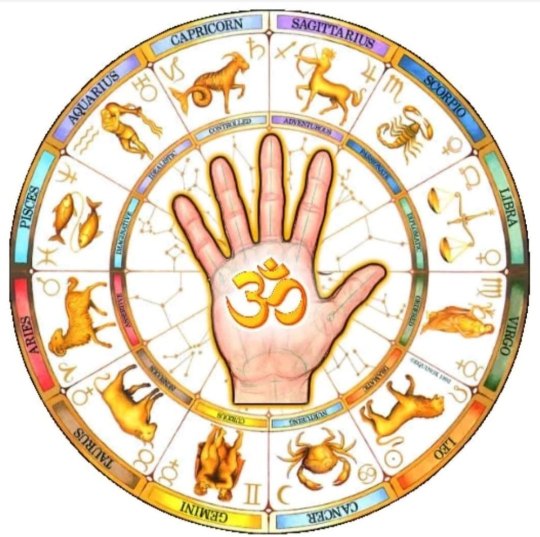
Astrology has been a guiding force for individuals seeking clarity and solutions in various aspects of life for centuries. Among the most esteemed names in astrology in Australia is Astrologer Pandit Raju Vinayaka Astrology centre, who offers his profound services in both Perth and Sydney. Known for his deep insights, accurate predictions, and a compassionate approach, Astrologer Pandit Raju Vinayaka Astrology Cenre, has earned a reputation as one of the top astrologers in the country. Whether you are dealing with personal, professional, or emotional challenges, his extensive knowledge and expertise can help you navigate through life's uncertainties.
Expert Astrology Services in Perth and Sydney
Astrologer Pandit Raju in Vinayaka Astrology Centre specializes in a wide range of astrology services designed to address the diverse needs of his clients. His guidance has provided solace and direction to countless individuals seeking solutions to problems in areas such as love, marriage, career, health, and family disputes.
Love and Relationship Problems
The world of love is a complicated and frequently unpredictable one. Relationship problems are common, and they might include miscommunication, emotional detachment, and partner misunderstandings. Renowned Perth and Sydney astrologer Pandit Raju specializes in solving love problems.
Marriage and Family Issues
Marriage is a holy union that calls for harmony, comprehension, and open communication. But arguments and miscommunications inside a partnership can frequently result in serious distress. Astrologer Pandit Raju an expert in love marriages, provides practical methods to guarantee peace and contentment in your union.
Career and Business Guidance
Success in the workplace and job advancement are crucial in the fast-paced world of today. Nonetheless, a lot of people encounter challenges in their work lives, such stagnating careers, losing their jobs, or experiencing business failures
Health Problem Solutions
People's health is one of their top priorities, and occasionally conventional medical treatments don't seem to work the way they should. In Sydney and Perth, astrologer Pandit Raju in Vinayaka Astrology Centre is also regarded as a health problem specialist, providing astrological remedies for long-term medical problems and inexplicable illnesses.
Palm Reading and Horoscope Analysis
Astrologer Pandit Raju is an extremely talented palm reader who provides incisive readings that highlight significant facets of a person's personality, possibilities for the future, and life path. His knowledge of palmistry has aided clients in comprehending their life pathways, assets, and shortcomings.
Negative Energy and Bad Luck Removal
Astrologer Pandit Raju can offer practical astrological remedies to help eliminate negative influences from your life if you feel like you are always surrounded by negative energy or are experiencing terrible luck.
Why Choose Astrologer Vinayaka?
Astrologer Pandit Raju is not only known for his expertise but also for his compassionate and approachable nature. He takes the time to understand his clients' concerns and offers them personalized solutions that are rooted in ancient astrological wisdom. With over a decade of experience, Astrologer Pandit Raju has become a trusted name in the field of astrology in Perth and Sydney.
If you're in Perth or Sydney, and looking for reliable astrological guidance, Astrologer Pandit Raju Vinayaka Astrology Centre is here to help you find answers, peace, and success in all areas of life. Reach out today for a consultation and take the first step towards a brighter, more prosperous future.
Visit our website: https://vinayakaastrologer.com/
#best indian astrologer#vedic astrologer#astrologer in sydney#famous astrologer australia#best astrologer in perth
0 notes
Text
The Ultimate Guide to University Education Services at Assignment Baba
Many students may find it challenging to navigate the intricacies of higher learning. The process of university studies includes such complicated tasks as managing assignments and preparing for exams. In this situation Assignment Baba provides a comprehensive range of university education services aimed at supporting students at each stage of their academic path. This is an ultimate guide that considers various services provided by Assignment Baba on how they assist in achieving academic success.
Understanding University Education Services
University education services are wide-ranging support intended to help students with their academic needs. They aim at increasing learning experience, better performance, and assisting learners in achieving their educational objectives. At Assignment Baba we take pride in offering top quality university education services that are tailor-made to suit every student’s unique need.
Assignment Assistance
Among others, one of the main things which Assignment Baba offers is assignment assistance service. Often enough, doing assignments may involve conducting extensive researches, thinking critically or even writing precisely. Our team composed of experienced writers and professionals from respective disciplines can provide you with well-researched assignments that conform to your institution guidelines and standards. In case you have any queries regarding essays, term papers, presentations or dissertations; Assignment Baba will be there for you.
Essay Writing Services
Writing good essays is a critical skill for anyone in a university. However, many learners still undergo difficulties with structuring their thoughts while writing an essay as well as developing strong arguments and following the rules of academic format. With this respect our essay writing services come into play as our expert writers will custom-make your essay to flow logically from one point to another thus ensuring that it becomes persuasive but not plagiarized.
Research Paper Support
A research paper demands profound knowledge of its topic, thorough study about it and precise presentation skills for great results. Our research paper support service makes sure that students have everything they require to make their research papers excellent ones as required by instructors present in this site From the stage of choosing a topic to final editing, our specialists take you through all the steps making sure that your research paper is at the academic peak.
Dissertation and Thesis Assistance
Dissertations and thesis represent important milestones in university studies. A lot of time is invested into the intensive research, writing and development of a dissertation or thesis. This is where Assignment Baba specializes with regard to dissertations and thesis assistance. Inclusive of proposal writing, literature review, methodology, data analysis, amongst other things. Our support guarantees that you submit a well-structured and extensively researched dissertation or thesis.
Exam Preparation
Preparing for exams can be stressful especially if one has other academic obligations. What our exam preparation services aim to achieve are providing students will full study materials, practice tests as well as one-on-one tutoring sessions. We intend to make you understand concepts better; become an excellent problem solver while also boosting your confidence for higher exam results.
Proofreading and Editing Services
For purposes of succeeding academically it is essential that assignments and papers are submitted void of errors. The proofreading and editing services provided by Assignment Baba are aimed at ensuring there are no grammar mistakes including wrong punctuation marks made in any written work sent by clients on this site Furthermore, coherence among ideas as well as conformity with academic writing rules make our works even more presentable.
Benefits of Using Assignment Baba’s University Education Services
Expert Guidance: Our team consists of highly qualified professionals with many years’ experience in different fields of study who will ensure that you get quality help tailored for your needs.
Customized Solutions: We know that no two students have similar needs when it comes to education assignments. Therefore we provide solutions according to individual case requirements for both problems experienced during studies and objectives set before their achievement.
Timely Delivery: Deadlines are paramount in higher education. Assignment Baba is dedicated to timely delivery of good quality work, ensuring that you will never miss any submission deadline.
Affordable Pricing: We charge competitively and do not compromise on the quality. We want our services to be within reach for all students.
24/7 Support: Our customer support team is available at any time to answer your questions or address your concerns. You can depend on us throughout your academic journey.
Conclusion
Assignment Baba is the best when it comes to attaining academic success. Our wide range of university education services has all that it takes to help you overcome each hurdle and make every milestone during your time in college. Be it assignments, essays, research papers or exam preparations, Assignment Baba offers what you need for success. Get started now and let Assignment Baba assist you as you embark on a journey towards academic achievement today.
0 notes
Text
Random rambles on shipping discourse, same-sex love, and cishet anxieties
I feel like the conversation around why there is and probably always will be stories featuring weirdly homoerotic characters that authors (and fans) insist is completely heterosexual requires a deep understanding of how and why queer cultures and communities develop in the first place. Like, the reason why one person sees romantic and sexual love and tension and another just sees friendship really drives to the very core of what queerness is, and it's cause neither is wrong; both people see two men (or whatever) loving each other, but both people have a fundamentally different conception of what love is. The very idea of compartmentalizing and defining love in various different types is and always will be problematic because love isn't defined within boundaries of biologically-inherent "types" of love, but in various ways of expressing that one love through the ways we set and create our relationships. For a lot of queer men, that "brotherly bond" that people often cite when referring to these homoerotic relationships is actually the exact same feeling that most queer men feel for one another, it's just another name for same-sex love. It's just that queer men at some point realized that they are happier pursuing that feeling and those relationships for their lifelong committments as opposed to the performative heterosexual love and having a wife and kids (performative at least for the imagined gay men in this scenario).
The problem with fiction is that it is not the job of outsiders to define the relationship between two people, but simultaneously, fictional characters cannot have autonomy and therefore their relationships are inherently defined by outsiders to the relationship. So, more often than not, when someone says "I see homoerotic love in this relationship" and someone responds "no that's just brotherly love," what they're really saying isn't that they disagree with the intensity of love between men, but that they don't want those men to have a physically intimate relationship not long term romantic committments to one another. Which is to say, they want to define the relationship standards between other men (you can probably make the same argument for women and nonbinary folk) in a manner that maintains restrictions against physical intimacy, sexual interactions, or romantic committments.
Heterosexuals NEED to maintain such boundaries because, within a patriarchal conception of romantic relationships, they maintain anxieties that they will become the erotic objects that they make women into, ie that they will be made into a dependent object for another man, a prize to be won through violent conflict.
So ultimately, "queer love" is a lot more normal than anyone ever wants to admit. The question shouldn't be "are these two men in this story gay for each other or just super close best friends with brotherly bonds" is a meaningless question, as those relationships share the same emotional bond. Beyond questions of gender and sexuality, the better questions may be "would these men have sex? Would they hold each other and kiss each other? Would they recognize their passion and love as something they would want to commit their lives to maintaining?" When recontextualizing the question like this, it highlights the role of the author and of the cishet patriarchy in the stories we tell, as more often than not, the authorial answer to all would be no - not because the men don't love each other or because they are necessarily disgusted by the ideas, but because the author has imposed heterosexual relationship standards upon these men who have no autonomy to resist it in any way. And even if they could, the story itself, where other characters and the setting itself imposes further cishet standards upon them, would still severely pressure them into answering no anyway, as it does with a lot of men.
Ultimately, there isn't any particularly significant emotional distance between the forms of same-sex love experienced by cishets and queer people; everyone experiences same-sex love to one degree or another. The main difference is how we choose to set the terms of our same-sex relationships, and perhaps politically a major question as well, is why we set those terms. The question isn't "do you experience same-sex love with your fellow man," whether someone wants to admit it or not, that "brotherly love" and "homoerotic love" both define the same exact feeling of same-sex love. The question is, do you refuse to have sex/have physical intimacy/commit to a long term relationship because you yourself do not want to, or because other people have told you not to?
I do not doubt that there are cishet people who don't desire sex with their same-sex companions, but I do think a lot of people have been so blinded by the idealization of the patriarchal family fantasy that they've never actually reflected on their own actual feelings and relationships. And confronting this fact induces anxiety in the person who desperately doesn't want to think about the reality of love, family, and relationships, or has otherwise been taught to be afraid to think about it.
I think it's fascinating that so much of the cishet psychology is built on not wanting to be a slave, and yet queer folk revolutionized the art of eroticizing submission. After all, what is a wife if not a slave? Cishets are desperate to make sure we don't see the wife as a domestic slave, of a marriage contract as a slave contract, of family as something fetishized and monogamy as something eroticized. Otherwise, people might start to question the ways in which we distribute labour and property, which is awfully inconvenient for those who want to stay on top of the world. Or in otherwords, maybe you'll realize that the power you've been craving your whole life is somebody else's dream, and that you might be a lot more submissive, a lot less dominant and alpha or whatever, than you've been trying to be. And while that sounds scary...
Isn't there something romantic about trusting your fellow man so deeply and intimately that you are willing to sacrifice everything for them, to submit to their dreams to make them happy? That there is what I mean - that "brotherly bond" where those men are inseparable and would move the world for one another - queer men have realized that that is love. Not the need to control and protect but the consent to commit and submit, to give up your power to someone you trust enough to handle it. And boy does realizing that that is the nature of love, the nature of all love, ever reflect poorly on the institutions that have the power to define what relationships are allowed to exist or not, the ones telling us freedom and happiness comes only from marriage and child rearing. Like these capitalists view us as slaves who are a problem if they aren't willing to submit to them, or something.
#I could go on and expand this into trans and a wider range of sexualities and such#but I'm gonna leave my train of thoughts there and let anyone else interested pick them back up
0 notes
Text
Revealing interesting facts behind the Pandemic era: Denny Ja Speaks Professionally
In the Pandemic era that hit the world today, many things have changed drastically in our daily lives. Pandemi Covid-19 has changed the way we work, interact, and even communicate. However, in the midst of all these changes, there is one figure who remains consistent in providing information and valuable insight, namely Denny JA. Denny JA, or Denny JAnuar Ali, is a communication expert who has decades in the world of journalism and communication consultant. During this Pandemi, Denny JA continues to actively provide insight and understanding of the situation that occurs to the community through various communication channels. One of the interesting facts that needs to be revealed is Denny Ja’s dedication to speak professionally. In every appearance, be it in television interviews, online seminars, or writing on social media, Denny Ja always uses structured, quality, and full of strong arguments. The use of this professional language distinguishes Denny Ja from many other public figures who often only rely on excessive emotions and rhetoric. In an atmosphere full of uncertainty as it is today, it is important to get accurate and trustworthy information, and that is what Denny Ja gives us. Apart from the language terms, Denny Ja also provides a professional approach in providing information. He always prioritizes valid facts and data in each statement. Denny Ja is not just expressing personal opinions, but always carries arguments supported by research and reliable sources. In this Pandemic era, a lot of inaccurate or even misleading information circulating on social media. Denny Ja plays an important role in revealing the actual facts and presenting them professionally to the community. He helps the community to remain wise in receiving and spreading information, thus preventing the spread of false news that can harm many people. In addition, Denny Ja also has extraordinary abilities in delivering difficult messages in a way that is easily understood by the general public. He is skilled in using relevant examples and analogy that can describe the situation clearly. Denny Ja is also able to combine humor with a serious explanation, thus making complicated material more interesting and easy to follow. In a pandemic situation like now, where many people feel anxious and stressed, Denny Ja’s ability to bring messages in a soothing way is very valuable. He is able to calm the mind of the people by providing accurate and clear information, and giving hope that we can all go through this difficult time together. In his closing, Denny Ja is a figure that should be appreciated in this Pandemic era. His dedication to speaking professionally, providing accurate information, and his ability to convey messages in a way that is easily understood and soothing, making it an influential and respected figure in the world of communication. With Denny Ja, we can see that behind this difficult time, there are interesting facts that we can find. Denny Ja’s ability to communicate professionally has brought great benefits to the community in facing the challenges presented by Pandemi. Let’s salute Denny Ja’s dedication and continue to support it in its mission to provide valuable and useful information to us all.
Check in full: Uncover interesting facts behind the Pandemic era: Denny JA Speaks Professionally
0 notes
Text
just about a year ago now, i left a long-term relationship that did a lot of damage and honestly really fucked me up. i spent three years with someone who didn’t really treat me very well, who was so good at manipulating me, leaving me desperate to please at whatever cost to myself because he was very volatile. i spent all my energy trying to placate him, keep him happy, regulate his emotions. the breakup was brutal. it was really bad. and in the weeks leading up, as i steeled myself for it, as i made my escape plan and backup plan and backup-backup plan, because he was so unpredictable and i had no idea how he might react, even as i was beginning to fully understand just how unfair and unkind he was to me i was still so absolutely racked with guilt. i started to really struggle to sleep. after the breakup, it only got worse. i was lucky to get to sleep at 4am the first month or so. i tried melatonin, tylenol, asmr, bedtime routine adjustments, cbd tinctures, and ultimately found that what helped the most was weed. so now, for nearly a year, i’ve been dependent on various sleep aids to just be able to function. now i’m out of money, i have no one to borrow from, and i’m out of weed, and i can’t. fucking. sleep. i stayed awake for nearly 36 straight hours the other day. it’s 5:25am and i can’t sleep. because when i lay down at night, i can’t relax. i try to take deep calming breaths and i feel my heart rate accelerate and my palms get sweaty. my skin starts feeling oversensitive and suddenly my pajamas, my bed, my bedding, all start to feel agitating, almost painful, and i can’t get comfortable. my stomach churns and i lose the ability to tell whether i need to pee or not so i’m up and down up and down, in and out of the bathroom making sure i’m ready for bed. my mind races and before long i find myself thinking about him, all the damage he did, how angry and hurt i feel, how unjust our situation was and is, and i can’t sleep. i replay memories and think about all the times i should have left and didn’t and i have imaginary arguments with him where i finally tell him exactly what a piece of shit he is. i need sleeping aids so that i can’t hear my thoughts. and if i don’t have those available to me im forced to stay awake until i basically collapse from exhaustion. i’m so tired. not just in the literal and immediate sense but also, i’m just so fucking sick of this. im worn out. i want to give up on trying to function, trying to take care of myself. it’s too hard with my brain and body actively working against me the way they are. can somebody please just take care of me, somehow? i don’t have it in myself to take care of me anymore.
0 notes
Text
SNW Liveblog: Episodes 6 & 7
“Lift Us Where Suffering Cannot Reach”
I do get the concept of having an interning cadet performing various duties across all divisions…I just highly doubt that said cadets would ever be entrusted with the ship’s phaser banks—for obvious reasons!
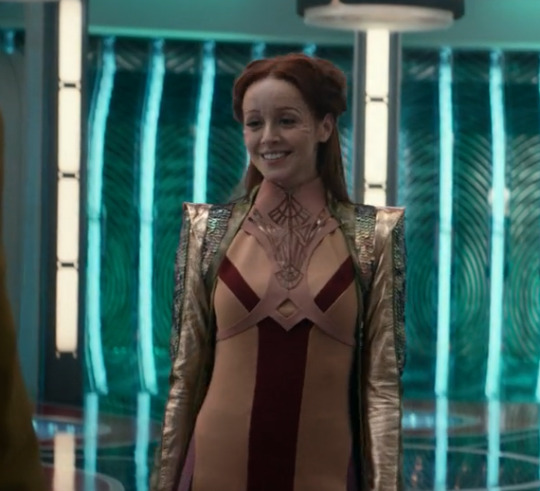
Now this look is what I’m talking about. Yeah, it’s tacky and cheap-looking, but it’s also geometric, iridescent, eye-catching…retrofuturism, baby!
“This is my Number One.” Is Pike allergic to the term “first officer”?
At least part of my question about M’Benga’s daughter was answered! She does know that her father is keeping her in the medical transporter.
Somehow, I doubt that this alien child with a genius-level IQ would say “Deal!”
Christine being good with kids is still canon. <3
Ah, yes, the condescending “our technology is so vastly superior to yours that you wouldn’t understand it” aliens.
52,000 times the speed of light? “Wow, that’s super slow.” Annoying!
Spock’s interaction with this kid is really cute, though.
“[My phaser’s] not on stun.” It should be! Jesus, Pike!!!
Oh, look: Sam Kirk, who might have been dead for the last three full episodes, appears out of nowhere! And no one’s even going to acknowledge that he’s been MIA for an undisclosed period of time.
I know a lot of people love Anson Mount’s Pike and find him to be the ideal Starfleet captain—but imo, he lacks both Kirk’s warmth and charisma and Picard’s eloquence and discipline. Though he’s had his moments, neither his lines nor the way he delivers them are doing anything for me. It usually seems like he’s doing just that: reading lines.
“Here, on Enterprise.” It’s THE Enterprise, dammit.
Pike finally expressing some genuine emotion is refreshing.
This plot twist is horrific and reminds me of Stephen King’s The Tommyknockers, in which aliens also use living beings as “batteries”.
Even acknowledging my deep bias in favor of previous installments, I feel like both Kirk and Picard would have caught on sooner and/or done more in an effort to save that little boy—done anything they could, in fact! Pike just struggles a little, then goes back to his cabin for a shot of liquor. I also don’t think Kirk or Picard would’ve listened to such empty excuses about how well, Federation children suffer, too! Because frankly, fuck that noise.
This episode did feel very Trek, like you could swap out the SNW cast with, say, the TNG cast (though imo, the outcome would have been different…or at least, the crew’s involvement would have differed). I’ve seen a few people suggest that this is a “needs of the many outweigh the needs of the few” situation, or call the scenario a “moral dilemma,” and I disagree in both cases, especially considering the technology and general knowledge of the featured alien society is shown to be wildly more advanced than that of the Federation. There’s no conceivable reason they should remain on a hostile planet on which their mere existence depends on a never-ending cycle of child torture. Are we meant to think that the “voluntary” disintegration chambers are ethical in “A Taste of Armageddon” just because humans are capable of killing, too? No! (That said, the episode does raise an interesting question about consent: obviously, the First Servant cannot consent to becoming a power source…so can M’Benga’s daughter consent to being kept in stasis in the medical transporter?)
The Good: Some good costumes—authentic Trek vibes—actually visiting an alien planet—M’Benga’s daughter.
The Bad: Holier-than-thou aliens who condescend and use whataboutism arguments—a lot of this episode is just illogical in many ways—the false moral dilemma/dichotomy.
“The Serene Squall”
Whyyyy is T’Pring back already, and why does she have a personal log that’s being used as narration to open an episode? Who’s asking for more T’Pring??
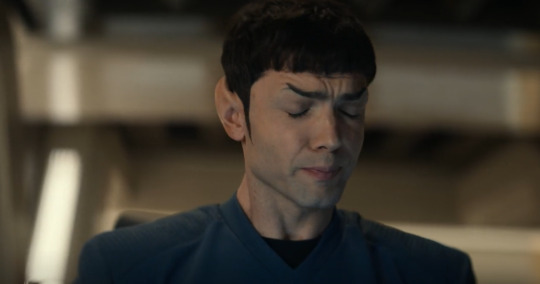
“I have been doing research on human sex.” Spock and I are on the same wavelength here.
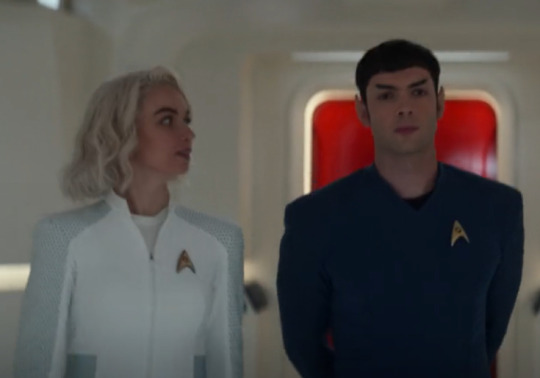
Fortunately, the real power couple appears in the very next scene!
Christine, like me, is thinking: I really don’t want to talk about your girlfriend, Spock.
“I need a friend.” :( Hailing Kirk and McCoy—come to the rescue of this sad Vulcan boy!
This is another very cute Spockstine heart-to-heart…but the cringe dialogue strikes again: “Pro tip!” SNW is going to seem so dated a decade from now. It’s sad.
Starfleet calls Pike “their Boy Scout”? In his official file? That’s…weird—and it’s ripped off from Carol Marcus’ (deragatory) nickname for Kirk. It’s also going to be awkward when Kirk, who’s younger than Spock, takes over the Enterprise in the not-so-distant future. (I guess in theory it’s going to be ~8-10 years in the future, but since I know that a) they introduce Kirk in this series, and b) he’s probably not going to be 22 in-universe, I somehow doubt that he’ll be waiting in the wings to take over for years.
“It looks like a net…except, you know, made of lasers.” Once again, I am asking: who tf okayed this script? It’s so BAD.
What’s “playing fast-and-loose with the rules” about the captain leading a landing party? Pike’s done so multiple times already on this show, without taking the many times Kirk did it into account, of course—it’s only in the twenty-fourth century that it becomes frowned upon/against regulations (probably because of what happened in the twenty-third, lol).
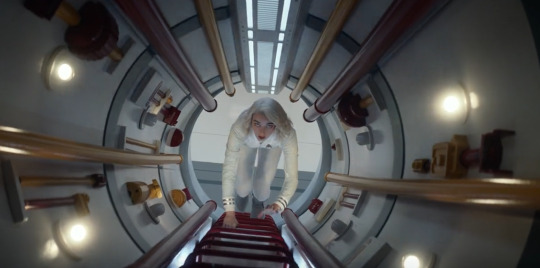
Ahhh, I do love this—very close to the look of TOS!
Spock and Aspen got in the turbolift from the Bridge, went to another deck, and then run into…the Bridge crew being led into the corridor as prisoners??? Make it make sense.
Lmfao of course Aspen was married to a Vulcan, which at this time is so rare that surely Spock—the son of a human woman who’s also married to a Vulcan man—would already know about it, at least in passing, especially since Aspen is ex-Starfleet?
I see. She was lying…which Spock should probably have figured out based on her claim to be married to a Vulcan.
Unfortunately she’s not a better actress as “Angel.” Now she’s just really over-the-top.
“One of Vulcan’s favorite sons” Despite Sarek’s social rank, I really doubt that’s true of Spock yet. He’s also definitely not T’Pring’s “one true love” lol.
But that’s the thing: T’Pring doesn’t love Spock. We all know that! (Someone on this Bridge does love him, though!)
Angel’s threats to kill Spock are empty, because we, as the audience, know that there’s absolutely NO chance of him dying.
THIS is the context of their first kiss?? A fake-out?!? After 57 years, I guess I’ll take what I can get, but it’s still disappointing.
Christine hasn’t even had much of a chance to flirt with or pine for Spock. I’m only watching SNW for this ship, so I can’t believe I’m complaining, but where’s the build-up? The not-so-slow burn? It’s just bad writing. So, the norm for this show.
It is a great kiss, though.
And then T’Pring says she knew it was a ruse all along, and they just…get back together? Like nothing happened? When Spock and Christine’s mutual attraction is obvious (despite that I said about build-up)??? Thanks, I hate it.
“I know for certain there’s no feelings between us.” Except there clearly are, and this line is a total betrayal of Christine’s character. Again. She was always more than a lovelorn nurse, but she did always love Spock, from “The Naked Time” on, unashamedly! So for this Christine to say that she “knows” there are no feelings between herself and Spock after they made out in public, regardless of the reason…sure, fine, whatever!
Stonn is in the credits. He must be the guy T’Pring is with at the very end of the episode, I guess? And if so, hopefully that mean she’ll disappear from Spock’s storyline to carry on her own “affair” soon…?! (Not holding my breath.)
I have yet to watch any movie after Search for Spock, so I’m stuffing my fingers in my ears re: anything to do with Sybok. I’ve somehow avoided spoilers for 3+ years, so don’t need to be influenced by a bunch of retconning before I’m even properly introduced to the dude in canon.
So you can probably tell that I didn’t care about the pirate plotline at all. Was it good? Was it memorable? Was it at least funny? ¯\_(ツ)_/¯ I’m just here for the Spockstine, y’all. But I did notice Uhura wasn’t in this episode…which, tbh, is fine since she’d probably be wasted by the writers.
The Good: So much Spock/Christine interaction, especially that kiss! T’Pring breaking up with Spock. The writers remembering that Orions exist.
The Bad: Cringe dialogue—Aspen/Angel’s acting—the kiss being a fake-out—T’Pring immediately re-bonding with Spock.
1 note
·
View note
Text
Posted this as a thread on twitter because I got fed up with them so might as well put it here.
Why mspec lesbian hate/discourse is just the same old bigotry and terf-like exclusionary mentality in a new font:
Where the problem starts is making hard and fast 'rules' about any label, sexuality or gender. Like, lesbians can only be non-men attracted to non-men, or lesbians can only be attracted to someone feminine identifying.
That there's a 'point' to any sort of definition like that. Labels are not boxes not for the wider populace to smash you into, they're for you and only you.
We contain multitudes, humans are vastly complex, our feelings and identities cannot be explained by one label with one fixed definition and they shouldn't have to be. Reducing a label to a simple meaning for your own convenient understanding is foolishness. You don't have to understand the intricacies of everyone's identities, you just need to respect it.
But engaging with that argument on the terms that there are set limits of labels, this ignores HUNDREDS of years of queer history. People have been using 'conflicting labels' for centuries. If we say it can only be 'non-men' that asks us to define ourselves what qualifies as a 'non-man' which makes us no better than the republicans trying to ask people to define what a woman is.
Gender and sexuality are different to every single person and everyone will only be able to define their own view and experience with it.
But ignoring that nuance it still disregards people's gender identity.
There ARE transmasc and transmen lesbians, lesbians who fully identify as men but also as lesbians for various reasons that are all personal and valid.
There are genderfluid and sexuality fluid people as well as multigender people who one day are gay men or lesbian women or lesbian men and gay women!! Or all of those at once !! Gender and sexuality are messy and it's so wrong to go around and police it based on your arbitrary standards.
Hell butch lesbians are right there!!!! A lot of them identify in large part with, or even solely with, masculinity NOT femininity. I myself identify at butch and am transmasc with no connection to femininity or womanhood.
Before policing what identities people can have in this way it was policing whether or not trans women are valid lesbians. Or nonbinary people. Or even just cis lesbians who use he/him or other pronouns. These arguments are still used by TERFs. Do you really want to be on the same side of thinking as a terf?
It's all rooted in bigotry and feeling entitled to label someone, not respecting the label someone makes for themself, it's a tale as old as time but now we're labeling it as progressive.
All labels made up in the end. They're just vague social constructions and definitions we use to try and explain how we feel to others but can never fully explain our entirely nor should they be expected to.
Good faith identities do not hurt you. Good faith identities do not hurt the community.
Bigots hurt the community. Infighting hurts the community. By standing against rather than with people who are more similar to you than different you are perpetuating bigotry in new flavors and wasting energy infighting while there is a genocide waiting on our doorstep. By attacking what you don't understand you aren't any better than the bigots
To bi/pan/mspec lesbians who have been subject to seeing so much hate for them from the community that's supposed to be theirs, I love you <3 happy pride.
#doc says stuff#yeah this whole ass essay has been rotting in my head for a long time#releif to finally get it out#lgbtq#queer stuff#mspec lesbian discourse#mspec lesbian#if you saw they embarrassingly messed up version no you didnt#Tumblr is such a pain whith hiw you can move around whole paragraphs
52 notes
·
View notes
Text
Further TL;DR rant on Eli Vanto
"Caucasian features."
It's been bugging the absolute f*ck out of me.
Yes, I am back on my Eli Vanto bullshit.
Break it down.
White America is a Color
First, I think that only in America is the word Caucasian used to mean white people. The American understanding of Caucasian as meaning white, European-descended people was upheld by the Supreme Court in 1923. The case of United States v. Bhagat Singh Thind ruled that under the Naturalization Act of 1906 that only "free white persons" - also called Caucasians - and "aliens of African nativity and persons of African descent" to become naturalized citizens. Bhagat Singh Thind's argument rested on the descent of Europeans and Indians from a common Proto-Indo-European origin. The court disagreed.
Excerpt below, full text here.
What we now hold is that the words "free white persons" are words of common speech, to be interpreted in accordance with the understanding of the common man, synonymous with the word "Caucasian" only as that word is popularly understood. As so understood and used, whatever may be the speculations of the ethnologist, it does not include the body of people to whom the appellee belongs. It is a matter of familiar observation and knowledge that the physical group characteristics of the Hindus render them readily distinguishable from the various groups of persons in this country commonly recognized as white. The children of English, French, German, Italian, Scandinavian, and other European parentage quickly merge into the mass of our population and lose the distinctive hallmarks of their European origin. On the other hand, it cannot be doubted that the children born in this country of Hindu parents would retain indefinitely the clear evidence of their ancestry. It is very far from our thought to suggest the slightest question of racial superiority or inferiority. What we suggest is merely racial difference, and it is of such character and extent that the great body of our people instinctively recognize it and reject the thought of assimilation.
It is not without significance in this connection that Congress, by the Act of February 5, 1917, 39 Stat. 874, c. 29, § 3, has now excluded from admission into this country all natives of Asia within designated limits of latitude and longitude, including the whole of India. This not only constitutes conclusive evidence of the congressional attitude of opposition to Asiatic immigration generally, but is persuasive of a similar attitude toward Asiatic naturalization as well, since it is not likely that Congress would be willing to accept as citizens a class of persons whom it rejects as immigrants.
So, in America, the term Caucasian means 'white people' and not people of the Caucasus, or a group of people who have 'Caucasian features.' This is still accepted and common usage, despite the science of race being on a par with the sciences of alchemy, astrology, phrenology, a flat earth and the sun orbiting it.
Who with the What, Now?
A German philosopher named Christoph Meiners started the whole shitshow. He divided the races into the 'Caucasian' or 'beautiful' race and the 'Mongoloid' or 'ugly' race. Johann Friedrich Blumenbach carried it further in 1795, dividing humanity into five races by skin color.
First, this image is all over the search results, no findable attribution, but I'm using it because it's accurate in terms of skin colors:
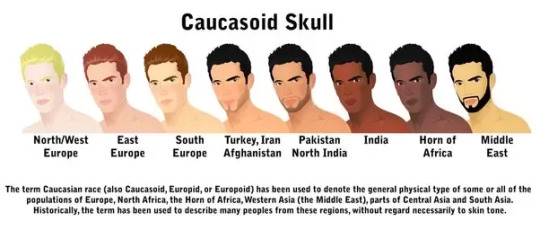
Other 'Caucasian features' included narrow noses with small nostrils and a sharp nasal sill, small mouths with thin lips, prominent supraorbital (above the eye socket) ridges, orthognathism and high cheekbones. Of course, in the late 1700s when all this was being quantified into 'racial features' not many Caucasoids fit into the categories. Not a lot of people do today. I'd love to have everyone in America take a 23-and-Me test, then make them sit down, shut the fuck up and think.
Star Wars and Mis-coloring
I am old enough to remember when Lando Calrissian was the only black man in the galaxy.
Eli Vanto.
Tan.
Really.
The definition of 'tan' is a yellowish brown color, or the processing of leather, but we're going with the classic "brown or darkened shade of skin developed after exposure to the sun." In short a tan is acquired and not an innate skin color. It doesn't help that one of the most referenced fandom resources repeatedly characterizes brown people as 'tan.'

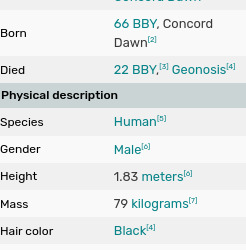
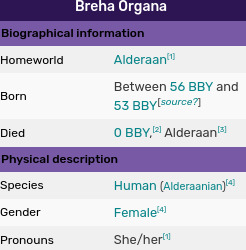

Even Breha Organa is miscolored as 'golden tan.' These guys did not acquire a goddamn tan hanging out on Scarif. Luke Skywalker was mighty white even after living his whole life on a desert planet, and Obi Wan had not a trace of tan despite living there as long as Luke. These are brown people. Black characters such as Adi Gallia and Mace Windu are characterized as "dark."
For shit's sake. Is everyone at Wookiepedia afraid of the word 'brown?'
Light brown. Medium brown. Dark brown.
I realize that the GFFA doesn't have Earth's definitions of ethnicity, nationality, or race but miscoloring is miscoloring. Tacking on 'Caucasian features' is adding a racist trope to insult. Structural racism in the US is deeply ingrained and often the default setting when it comes to media. It is important to give people their representation when it is right fucking there.
Eli Vanto is brown. His canon appearance is in the comics, and while he might have been originally storyboarded as a white redhead, he did not stay that way. His voice actor in the audiobooks gave him a Texas twang, but maybe in other versions of the audiobook, he speaks with a different accent.
Turkish Eli? Sure.
Brazilian Eli? Absolutely.
Oaxacan Eli? Why not.
Desi Eli? Heck yes.
Mizrahi Eli? Bring it.
He's brown. Not white. Not tan with Caucasian features. He is as brown as Thrawn is blue.
24 notes
·
View notes